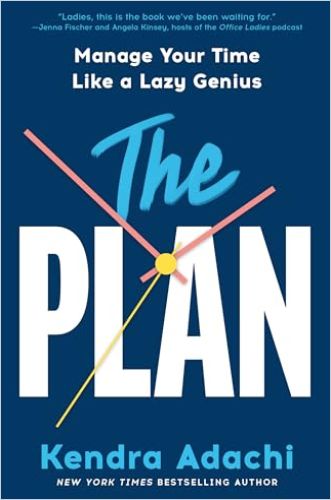Standard productivity models often ignore the invisible labor and shifting demands many women navigate daily. Productivity guru Kendra Adachi proposes a refreshing, gentle alternative built on a realistic view of women’s lives.

Productivity, Rewritten for Women
If you’re a woman and you’ve struggled to find a productivity system that works for you, it’s probably not your fault. According to productivity guru Kendra Adachi, today’s leading productivity approaches likely will fail you, no matter how dedicated or motivated you are — because they’re not written for you.
Most top productivity mavens are men, Adachi says, and they speak to a default audience of men, who enjoy a level of schedule flexibility and career autonomy that many women lack. These male experts rarely acknowledge that women often must juggle their careers with unpaid domestic labor and caregiving duties, so following their advice is more likely to lead to exhaustion than meaningful change. Adachi offers an alternative that’s more suited to women’s complex and often unpredictable lives, and more likely to lead to the presence and attunement that many women crave.
Flexible Focus
At the core of Adachi’s approach is a fluid and flexible mindset about productivity that focuses more on priorities than on hard and fast goals. In essence, her process goes like this: Start by considering what you care most about in the present moment, whether that’s upcoming events, spending more time with your children, performing well in a new job, or just getting enough sleep. Manage conflicting priorities by identifying your one “singular” priority — the one that matters more than anything else. For example, if you yearn for both more time with your children and more sleep, getting enough rest time should take top priority, because you won’t have the bandwidth to be present and engaged with your kids if you’re tired.
We are not the problem. A patriarchal society that birthed a productivity-industrial complex that keeps selling us tools that ignore our needs and lived experience is the problem.Kendra Adachi
Next, Adachi says, take one small step toward achieving your singular goal. For instance, if you need better sleep, try limiting your smartphone usage at night, using a white noise machine, or changing the time you go to bed or wake up. Don’t make several changes at once, Adachi advises. Pick the one that you think would be most effective and stick to it.
If life throws you a curveball, don’t panic. Remain flexible. Name what matters most in this new situation, and follow your intuition about how best to respond. For example, if a meeting runs late, you might opt to scrap your original dinner plan and instead call home and have your kids start prep for a quicker meal.
Less Hustle, More Heart
Adiche’s PLAN framework is less a set of specific steps than a fresh mindset about what makes for a satisfying, rich, and livable life in today’s world, specifically for women, given their complex lives.
P stands for “prepare,” but rather than planning according to a daily system, Adachi suggests you should prepare yourself and your expectations. Life is finite, she says, and no amount of preparation can change that fact. So break free of the expectations that can keep you stuck in survival mode. Stop trying to juggle so many balls, and focus on what matters most.
L stands for “live.” By that, Adachi means staying present and fully experiencing life. Start by lowering the bar for what qualifies as a good day: Accept that the days when everything goes right are the exception, not the rule. Apply the same generous attitude to yourself; appreciate yourself as you are instead of seeing yourself as an incomplete person in need of nonstop optimization.
Women are told to manage their time and live their lives according to the same rhythm and rules that men do, but we literally cannot.Kendra Adachi
A stands for “adjust.” Shift your goals to reflect your current reality. Align your ambitions with the levels of energy you’re willing and able to devote to them. For example, don’t compare your physique with a professional athlete’s unless you’re willing to put in the same level of training. Make choices based on where you are, not where you think you should be, and remind yourself that your present circumstances won’t last forever. This, too, shall pass.
N stands for “notice.” Instead of assessing, judging, or reacting to events and situations, Adachi says, reflect on them with kindness. When you feel excited or fearful, pause before responding to these feelings. In contrast to standard productivity advice, Adachi recommends prioritizing your mental health above getting your tasks done. When you feel run down, listen to your body’s cues and rest. To cultivate presence, appreciate the goodness in every situation.
Gentle Gets It Done
Adachi goes on to offer powerful strategies for getting things done while ensuring your life forms an integrated, healthy whole. To align your daily actions with your whole, authentic self, she recommends four ongoing activities: noticing your energy, so you can match your activities to your energy levels; constantly adjusting your expectations to align them with the reality of what you can do; always building flexibility into your plans; and intentionally prioritizing time spent with others.
Her version of a task planning system is just as flexible and compassionate as her PLAN approach. She calls it the “Lighten the Load” framework: a versatile four-step method to organize your life. First, she says, make your workload visible by writing down everything you have on your plate. Second, categorize the items according to how much they matter. Third, focus on what matters most, and break these items down into actionable tasks and decisions. Finally, organize your daily to-do list so that you can execute similar tasks in one fell swoop.
You are in charge of your list. Your list is not in charge of you.
Adachi also offers helpful strategies for aligning your activities with your menstrual cycle (advice you won’t find in David Allen’s books!), planning projects so you can actually get them done amid the welter of everyday life, and setting meaningful long-term goals.
In the end, Adachi offers a system that takes the emphasis off rigid, linear structures, schedules, and goals, and places it on living a life that’s integrated, authentic, and realistic. Possibly the greatest impact of her empathic, wise book lies less in her approaches and frameworks than in the simple message that when you choose presence over pressure, you make room for a life that actually feels like yours. You don’t need to do it all, Adachi assures: You just need to do what’s right for you, right now.














